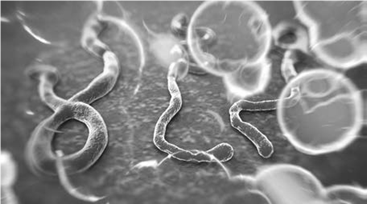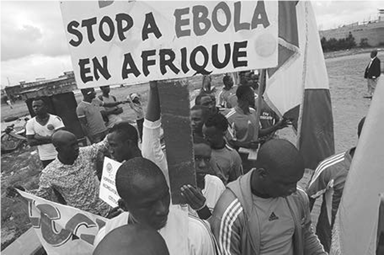BURKINA FASO
Revolutionary Communist Party of Volta (PCRV)
On the Ebola epidemic that is striking the West African sub-region
Since mid-April of 2014, the Ebola virus that was only known in
Central Africa, specifically in the Republic of the Congo (DRC), Uganda
and Gabon, appeared in the sub-region of West Africa, specifically in
Guinea-Conakry, from where it has spread to Sierra Leone and Liberia.
According to reports from some NGOs and the World Health Organization
(WHO), which became involved in those countries to fight the epidemic,
in four months the disease caused more than 930 dead, and there are
about 1700 probable cases of people infected [as of August when this
was written – translator’s note], of which an important part are health
care personnel from the three countries.
 The President of Liberia, Ellen Johnson Sirleaf, declared that the
situation in her country is “very serious and we are headed towards a
catastrophe.” The WHO calls the epidemic a “bonfire” while the NGO
Doctors Without Borders said at the end of June that “the epidemic is
out of control.” The threat of the epidemic spreading to other
countries such as Guinea-Bissau, Mali and Ivory Coast, which share
borders with countries struck by the disease, is a reality, especially
when the epidemic has already struck in Nigeria, although this is a
country that has no common borders with the countries where the
epidemic developed.
The President of Liberia, Ellen Johnson Sirleaf, declared that the
situation in her country is “very serious and we are headed towards a
catastrophe.” The WHO calls the epidemic a “bonfire” while the NGO
Doctors Without Borders said at the end of June that “the epidemic is
out of control.” The threat of the epidemic spreading to other
countries such as Guinea-Bissau, Mali and Ivory Coast, which share
borders with countries struck by the disease, is a reality, especially
when the epidemic has already struck in Nigeria, although this is a
country that has no common borders with the countries where the
epidemic developed.
West Africa is one of the most populous regions in Africa and also the
area that has the largest free movement of people, and this has been
the case for centuries. Upper Volta, now called Burkina Faso, which has
borders with Mali and Ivory Coast, will not escape if these countries
are infected, especially if one considers the mobility of the
populations between those countries and ours and given the porous
borders among the countries of the sub-region.
This epidemic has acquired the character of a regional catastrophe, at
a time of a political, social, economic and military crisis, or one of
bankruptcy, of the neo-colonial states. The population suffers from
humanitarian crises, with displacements caused by reactionary wars and
their consequences. The governments of the countries of West Africa are
showing inertia and irresponsibility, which has led the WHO to sound an
alarm. Quickly and prematurely, the epidemic was declared by Guinea, a
country which however does not have the means to identify the virus,
let alone to care for the sick. On the initiative of the WHO, the
epidemic has been addressed properly and has been declared a great
danger to the world; moreover, the WHO gave instructions to the heads
of State of the sub-region that they should inform their peoples and
take the necessary measures, such as the state of emergency in the
countries that are severely affected, Liberia and Sierra Leone.
Some countries bordering on Burkina Faso are carrying out information
and awareness campaigns for their populations against this threat.
However, the political and health authorities in Burkina are doing
practically nothing, based on the fact that there has been no case
detected in our country and that we are far from the countries
infected. The epidemic has been plaguing the sub-region since March of
2014 and until July the authorities remained in a “state of
implementing a response plan to deal with any eventuality,” as the
representative of the WHO told reporters in Burkina Faso on July 11,
2014. Nothing is being done with the information, nor to make aware or
alert the population on measures to be taken. Nothing concrete to take
measures to prevent the spread of the virus. No campaign to train
health care workers who could cope with a possible outbreak of Ebola.
As always, the government of the Republic is waiting for the
catastrophe to break out, when it will mobilize to beg for foreign aid,
aid that will quickly be hogged by the vampires of the Republic at the
expense of aid to the poor population, as is the case with malaria with
infected mosquitoes that have been a great help to the authorities and
its allies, especially Alizeta Gando who has done business for
thousands of millions with the CFE and AIDS, whose funds have been used
by the presidency.
The public health sector has been neglected in favor of the private
sector without having taken any steps to develop health research; the
neo-colonial countries of the sub-region depend entirely on the “good
will” of the imperialist countries and their NGOs, such as Doctors
Without Borders, in order for them to take measures to control the
epidemic. This will prove once again their lack of awareness and
ability to protect the population against the disease, measures and
treatments that they have begun to implement for the sick people
repatriated to their countries such as is the case of the United States
and Spain.
The grave threat of the Ebola epidemic concerns all the social and
political forces of our country and the West African sub-region, if one
takes into account what is at risk for the health and the dramatic
consequences for the population already stricken by a profound crisis.
With this statement the PCRV, vanguard party of the working class,
sounds the alarm to demand that the government of the Fourth Republic
assume its responsibilities and take measures to avoid a catastrophe
for our people and our country.
The
PCRV denounces the apathy and irresponsibility of the authorities of
the Fourth Republic in handling the threat posed by the Ebola epidemic
in West Africa. It denounces the contempt and carelessness with which
the authorities treat this grave public health problem.
 The PCRV demands:
The PCRV demands:
* That measures be adopted to raise awareness and educate the
population about hygiene measures and precautions to take to avoid
infection. This is of great importance given that access to medical
care and hygiene is already very limited among the poor population in
the cities and the countryside, and that the cultural practices of our
population can be factors that aggravate the spread of the disease in
the case of an epidemic.
* That appropriate measures be taken to train and protect care health
personnel who are the sector of the population most at risk during
epidemics, as the situation in the countries that are the focus of
Ebola outbreaks and in Nigeria show daily.
* The creation of an effective epidemiological organization and border
control. This is very important given that a significant part of the
population has no access to health care centers and that also a
significant proportion of deaths occur at home, which limits the
ability to identify and determine the causes of the deaths and thus
quickly detect the epidemic.
We call on the health care professionals, the trade union organizations
in the health care sector and all those competent in that sector, to
organize and unify their forces to contribute to raising awareness and
educating the population to fight an eventual epidemic. We call on the
whole democratic movement in our country (trade unions, human rights
organizations, intellectuals, etc.) to mobilize to demand that the
authorities adopt measures appropriate to the situation to avoid a
greater humanitarian catastrophe in the country.
The PCRV expresses its solidarity with the peoples struck by the
epidemic, the internationalist solidarity of the people of Volta with
the hope that this epidemic will be controlled quickly in order to
avoid a new catastrophe in the sub-region. It is already faced with the
consequences of reactionary civil wars and imperialist aggression, as
well as the political, economic, social and military failure of the
neo-colonial regimes that every day show their inability to protect the
population and lead the countries to social progress and a true
democracy. Bread and freedom for the people!
August 2014
Revolutionary Communist Party of Volta
Click here to return to the Index, U&S #29
 The President of Liberia, Ellen Johnson Sirleaf, declared that the
situation in her country is “very serious and we are headed towards a
catastrophe.” The WHO calls the epidemic a “bonfire” while the NGO
Doctors Without Borders said at the end of June that “the epidemic is
out of control.” The threat of the epidemic spreading to other
countries such as Guinea-Bissau, Mali and Ivory Coast, which share
borders with countries struck by the disease, is a reality, especially
when the epidemic has already struck in Nigeria, although this is a
country that has no common borders with the countries where the
epidemic developed.
The President of Liberia, Ellen Johnson Sirleaf, declared that the
situation in her country is “very serious and we are headed towards a
catastrophe.” The WHO calls the epidemic a “bonfire” while the NGO
Doctors Without Borders said at the end of June that “the epidemic is
out of control.” The threat of the epidemic spreading to other
countries such as Guinea-Bissau, Mali and Ivory Coast, which share
borders with countries struck by the disease, is a reality, especially
when the epidemic has already struck in Nigeria, although this is a
country that has no common borders with the countries where the
epidemic developed. The PCRV demands:
The PCRV demands: